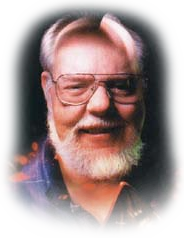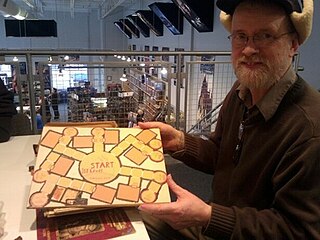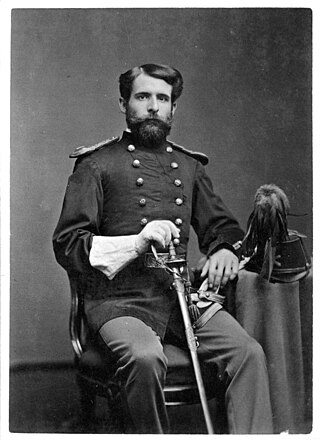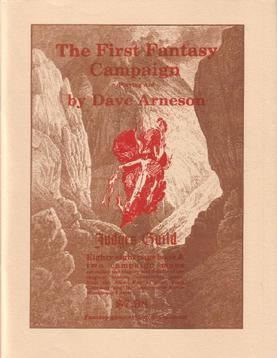
Dungeons & Dragons is a fantasy tabletop role-playing game (RPG) originally designed by Gary Gygax and Dave Arneson. The game was first published in 1974 by Tactical Studies Rules, Inc. (TSR). It has been published by Wizards of the Coast since 1997. The game was derived from miniature wargames, with a variation of the 1971 game Chainmail serving as the initial rule system. D&D's publication is commonly recognized as the beginning of modern role-playing games and the role-playing game industry, and also deeply influenced video games, especially the role-playing video game genre.

Ernest Gary Gygax was an American game designer and author best known for co-creating the pioneering role-playing game Dungeons & Dragons (D&D) with Dave Arneson.

David Lance Arneson was an American game designer best known for co-developing the first published role-playing game (RPG), Dungeons & Dragons, with Gary Gygax, in the early 1970s. Arneson's early work was fundamental to the development of the genre, developing the concept of the RPG using devices now considered to be archetypical, such as adventuring in "dungeons" and using a neutral judge who doubles as the voice and consciousness of all characters aside from the player characters to develop the storyline.

Miniature wargaming is a form of wargaming in which military units are represented by miniature physical models on a model battlefield. The use of physical models to represent military units is in contrast to other tabletop wargames that use abstract pieces such as counters or blocks, or computer wargames which use virtual models. The primary benefit of using models is aesthetics, though in certain wargames the size and shape of the models can have practical consequences on how the match plays out.

Blackmoor is a fantasy role-playing game campaign setting generally associated with the game Dungeons & Dragons. It originated in the early 1970s as the personal setting of Dave Arneson, the co-creator of Dungeons & Dragons, first as a setting for Arneson's miniature wargames, then as an early testing ground for what would become D&D.

The history of role-playing games begins with an earlier tradition of role-playing, which combined with the rulesets of fantasy wargames in the 1970s to give rise to the modern role-playing game. A role-playing game (RPG) is a type of game in which the participants assume the roles of characters and collaboratively create stories. Traditionally all the participants but one take on characters and determine the actions of their characters based on their characterization and the actions succeed or fail according to a system of rules and guidelines, and one of the participants takes on the role of game master who narrates the story, plays all the non-player characters and determine the challenge rating and the outcome of various actions. Within the rules, the participants may improvise freely; their choices shape the direction and outcome of the games.
Guidon Games produced board games and rulebooks for wargaming with miniatures, and in doing so influenced Tactical Studies Rules, the publisher of Dungeons & Dragons. The Guidon Games publishing imprint was the property of Lowrys Hobbies, a mail-order business owned by Don and Julie Lowry. About a dozen titles were released under the imprint from 1971 to 1973.

Don't Give Up the Ship is a set of rules for conducting Napoleonic era naval wargames. The game was published by Guidon Games in 1972 and republished by TSR, Inc. in 1975. The game was developed as a collaboration between Dave Arneson, Gary Gygax, and Mike Carr. It was the first collaboration between Dave Arneson and Gary Gygax, the co-authors of Dungeons & Dragons. Mike Carr edited the rules and researched the historical single ship actions that are included as game scenarios.
David Wesely is a wargamer, board game designer, and video game developer. Wesely's developments, inspired by Kriegsspiel wargames, were important and influential in the early history of role-playing games.

The Castle & Crusade Society was a chapter of the International Federation of Wargaming dedicated to medieval miniature wargaming.

Robert J. Kuntz is a game designer and author of role-playing game publications. He is best known for his contributions to various Dungeons & Dragons-related materials.

A board wargame is a wargame with a set playing surface or board, as opposed to being played on a computer or in a more free-form playing area as in miniatures games. The modern, commercial wargaming hobby developed in 1954 following the publication and commercial success of Tactics. The board wargaming hobby continues to enjoy a sizeable following, with a number of game publishers and gaming conventions dedicated to the hobby both in the English-speaking world and further afield.

The original Dungeons & Dragons boxed set by Gary Gygax and Dave Arneson was published by TSR, Inc. in 1974. It included the original edition of the Dungeons & Dragons fantasy role-playing game. Its product designation was TSR 2002.

David R. Megarry is a game designer most notable for the board game Dungeon!.
Braunstein is an experimental game and game genre introduced by David Wesely, a member of the Midwest Military Simulation Association, in the late 1960s, and originally played in the Twin Cities. Braunstein was important and influential in the early history of role-playing games.
Richard Leonard Snider was a game designer who worked primarily on role-playing games.

Adventures in Fantasy is a role-playing game published by Excalibre Games in 1979, designed by Dave Arneson and Richard Snider. The game is a fantasy system, similar to early Dungeons & Dragons (D&D), which Arneson co-created. It received mixed to negative reviews in game periodicals, including The Space Gamer, Ares, and Pegasus, and ultimately flopped. Arneson later bought the rights to Adventures in Fantasy and published a new edition in 1981 through his own company Adventure Games.

Strategos is a military wargame developed by Charles A. L. Totten for the United States Army, and published in 1880.

The First Fantasy Campaign is a supplement for fantasy role-playing games written by Dave Arneson and published by Judges Guild in 1977.